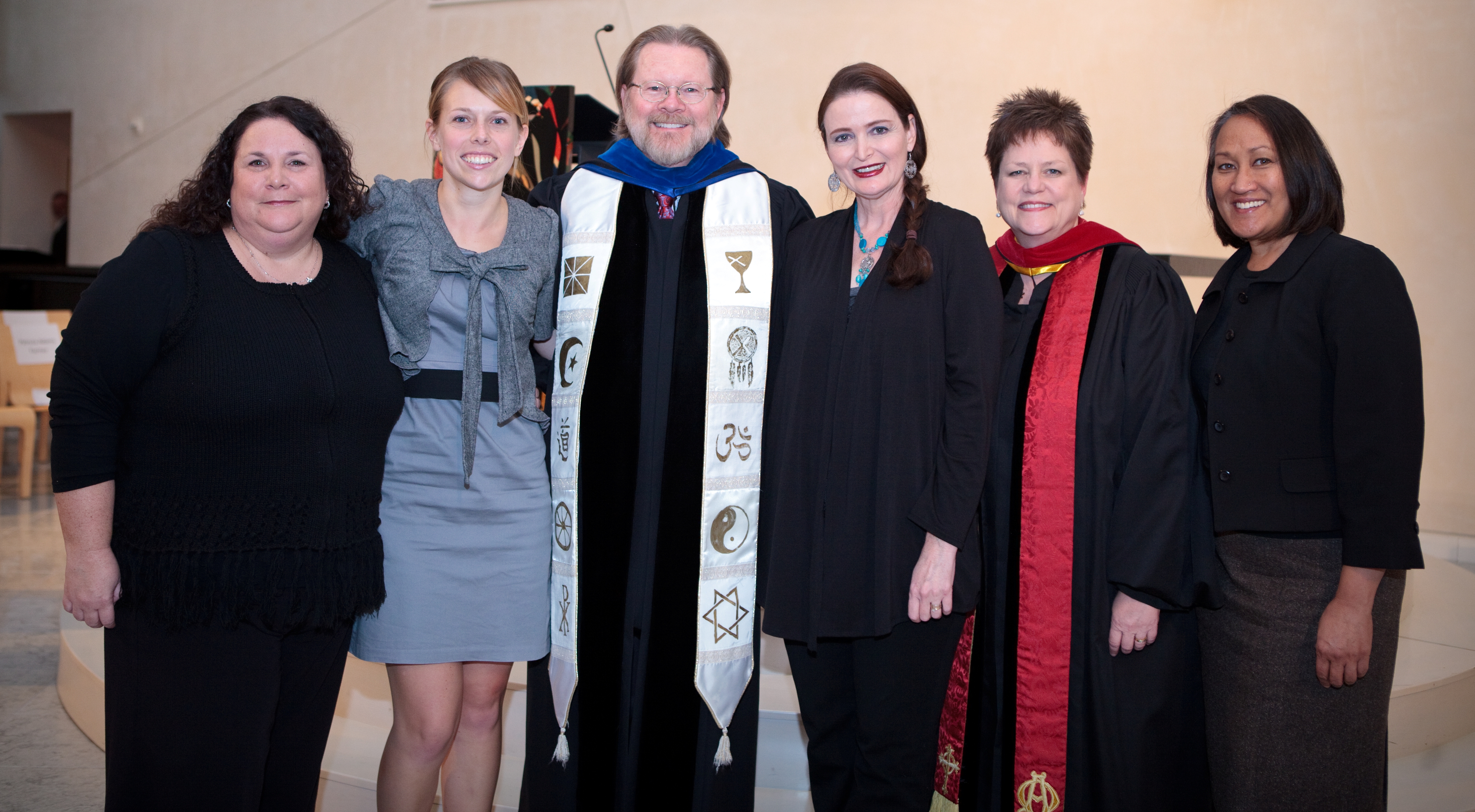
Dr. Ronald Farmer’s work creating programs, generating building funds and uniting people during his nearly 14 years as dean of the Wallace All Faiths Chapel and associate professor of religious studies was honored in a retirement celebration held Thursday in the chapel.
His accomplishments were many, but perhaps most profound is the legacy that goes beyond the tangibles of buildings and programs, said Chapman President Jim Doti, who hailed Dr. Farmer for bringing “new heart” to Chapman University’s spiritual life.
“We honor Ron today for many reasons, but most of all for leaving his imprint on the ethos of our university. Through his ministry, Ron gave new birth to our spiritual pillar. He did that by humbly and gently persuading us that Chapman’s spirituality is rooted in our passion for the search for truth. It is also a spirituality that is not symbolized by dogma, creed or ritual, but rather is made real by treating all people with dignity and respect,” President Doti said.
Among the most concrete signs of Dr. Farmer’s time at Chapman is the Fish Interfaith Center and Wallace All Faiths Chapel, said Marv Meyer, Ph.D., chair and Griset Professor of Bible and Christian Studies, Department of Religious Studies. Dr. Meyer joked that he was reminded of the old Joni Mitchell song,
Big Yellow Taxi
, with its lyrical lament that “they paved paradise and put up a parking lot.”
“What Ron did was just the opposite. He took the parking lot and made it into paradise,” Dr. Meyer said.
And he did it all with grace, said Marilyn Harran, Ph.D., professor, Stern Chair in Holocaust Studies and director of the Rodgers Center for Holocaust Studies. With his trademark gentleness, Dr. Farmer reminded people that “respect is a much better word than tolerance,” Dr. Harran said.
Dr. Farmer leaves Chapman for Brandman University, where he will develop an online religious studies certificate program. The move coincides with his and his wife’s plans to build a home in Bahia de Caraquez, Ecuador. (Read more about their plans in a previous
Happenings post
.)
In addition, the ceremony included remarks from Chancellor Daniele Struppa and from Rachel Bennett, administrative assistant to Dr. Farmer. There was also music performed by Disciples of Christ students and friends, a solo by Rachel Stoughton and a talk by Dr. Farmer titled “The Womb of Compassion — A Parting Word.”
The full text of Dr. Farmer’s remarks follows.
“The Womb of Compassion—A Parting Word”
Attempting to articulate the essence, the center, the heart of “spirituality” is a risky undertaking. Down-right foolhardy, some would say, for in spite of the many commonalities the world’s religions share—enabling interreligious dialogue and cooperation—the world’s religions understand Reality differently, sometimes dramatically so. Why, then, would someone who has spent nearly four decades studying religions venture to speak of a center or an essence of spirituality? Because I find it useful. The educator in me knows firsthand the value of heuristic devices, so I will take the risk and share with you, as a parting word, what I have come to perceive as “the essence of spirituality.”
I propose for your consideration that the essence of spiritually can be found in a word: Compassion. As the Latin roots of our English word make clear, compassion means “to feel with” another.
[i]
The term is similar in meaning to the English word sympathy, which is derived from Greek roots also meaning “to feel with,”
[ii]
and is related to the English word empathy, which is also derived from the Greek, meaning “to feel in or into.”
[iii]
To be compassionate, then, is to feel the feelings of another, to be affected by whatever affects another.
Compassion shines forth from the pages of the world’s sacred texts, and more importantly, you see it in the lives of deeply spiritual people. The gospel text read earlier is an excellent example.
[iv]
It would help us to regain something of the power of Jesus’ statement if we were to examine the remarkable Hebrew word for compassion, the word he would have uttered to his disciples.
[v]
The most commonly used Hebrew word for compassion is derived from a root meaning “womb.” Thus, to be compassionate is to be “womb-like.” A woman feels compassion for the child of her womb. What the womb is to the child, compassion is to the one who receives it. Not surprisingly, then, the word compassion bears nuances of life-giving, nourishing, caring, yearning for, and embracing.
The Hebrew word for compassion carries two strong implications we must not overlook. First, compassion is not only a
feeling
but also “
a way of being
which flows out of that feeling.”
[vi]
A compassionate person not only rejoices with those who rejoice and weeps with those who weep; a compassionate person also seeks to alleviate suffering and promote well-being. Frequently the gospel writers said that Jesus was “moved with compassion,”
[vii]
and in each case his compassion gave rise to an outward act: he fed the hungry, taught the ignorant, healed the blind, and cleansed the leprous.
Yes, compassion is more than a feeling; it also manifests itself in a way of being that flows out of that feeling. When we act compassionately, our compassion becomes a “womb” for others. Our compassion nurtures them, cares for them, embraces them. In a very real sense, then, our compassion is the environment that enables them to be reborn.
The second implication of the Hebrew word for compassion is that this “feeling the feelings of others” is much more than an
external
wave of emotion, a feeling from the
outside
, so to speak. On the contrary, compassion is the deliberate identification with others until we see things as they see them and feel things as they feel them—from the
inside
. No doubt, we men have a hard time comprehending this, but ask any pregnant woman and she will vouch for it.
Recent experiments by neuroscientists have demonstrated that there is also a
biological
aspect to empathy, that empathy is rooted in brain cells called ‘mirror neurons.’ Quite by accident—as so often is the case with major scientific advances—researchers discovered that these mirror neurons in the brain fire not only when a person moves or experiences an emotion; they also fire when a person
observes
the actions or emotional states of others. It’s as if we imagine we are the person we’re watching. But it’s more than merely imagining, more than some sort of virtual reality simulation. It’s a
physiological
activity. And these mirror neurons can’t tell whether it’s you or the other person who’s having the experience that’s causing them to fire.
There’s a genuine brain-to-brain connection; an interconnectedness, if you will. In a very a real sense, the discovery of mirror neurons dissolves the barrier between the self and others. By means of the mirror neuron system, we literally ‘read the minds’ of others. Within our brains, we create internal representations of the actions, sensations, and emotions of others, as if
we
were the ones moving, sensing, and feeling.
Thus, mirror neurons, sometimes referred to as empathy neurons, indicate that there’s a
biological
underpinning for ethics, that we’re hardwired to resonate with each other at the deepest level of our beings—something religious leaders have taught for centuries. Indeed, the point of many of the spiritual disciplines is to strengthen this nascent empathic connection.
Although they come at it from different perspectives, science and religion suggest that compassion or empathy lies at the center of things. I’m convinced that when we grasp the centrality of compassion, it transforms the way we relate to one another and the larger world around us. All of the artificial barriers we have erected to divide us from one another—religious, ethnic, economic, and yes, even the species barrier—all of the barriers come crashing down when compassion is understood as the essence of spirituality.
At no time are we more spiritual than when we hold others in the womb of our compassion. Amen.
[i] From com = with, and pati = to feel or to suffer.
[ii] From sym = with, and pathos = to feel or to suffer.
[iii] From en = in, and pathos = to feel or to suffer.
[iv] Some English versions use the word “mercy” rather than “compassion.” Although compassion and mercy are related terms, there is, especially in English, a subtle difference worth noting. Mercy carries the connotation of undeserved favor. It implies “a superior in relationship to an inferior, as well as a situation of wrong doing: one is merciful to someone to whom one has the right (or power) to act otherwise” (Marcus J. Borg, “Jesus and Compassion,” in The Living Pulpit 3 [1994]: 42). The word compassion does not carry this superior-inferior connotation. Therefore, in Luke 6:36 I prefer the translation compassion rather than mercy, especially in light of the verses which follow: “Do not judge, and you will not be judged; do not condemn and you will not be condemned. Forgive, and you will be forgiven; give, and it will be given to you . . . for the measure you give will be the measure you get back.”
[v] (racham).
[vi] Borg 42, italics added.
[vii] Matt 9:36; 14:14; 15:32; 20:34; Mark 1:41; 6:34; Luke 7:13.




Add comment